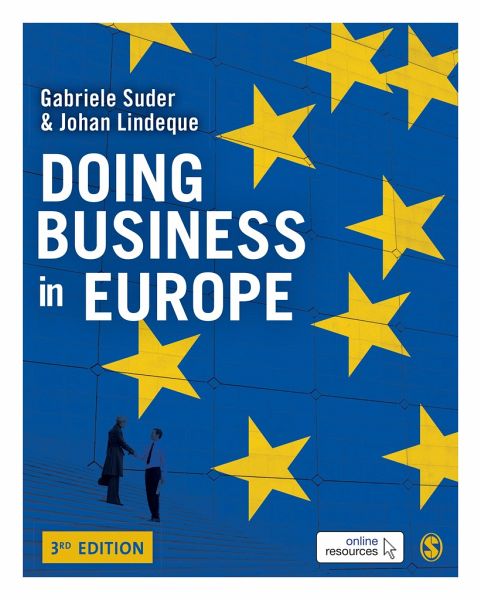
Doing Business in Europe
Versandkostenfrei!
Versandfertig in 6-10 Tagen
153,99 €
inkl. MwSt.
Weitere Ausgaben:

PAYBACK Punkte
77 °P sammeln!
The new third edition provides readers with the fundamental theories and concepts for understanding how business is done in Europe, linking it to the current European business environment through a range of up-to-date case studies and examples.Revised and updated to include recent changes in the economic and political climate of Europe, and thematic perspectives on key contemporary European challenges, the authors also bring into consideration non-EU Business in the EU as well as the way Brexit is likely to affect businesses.Also new to this edition: Examples and cases from a wider range of Eu...
The new third edition provides readers with the fundamental theories and concepts for understanding how business is done in Europe, linking it to the current European business environment through a range of up-to-date case studies and examples.
Revised and updated to include recent changes in the economic and political climate of Europe, and thematic perspectives on key contemporary European challenges, the authors also bring into consideration non-EU Business in the EU as well as the way Brexit is likely to affect businesses.
Also new to this edition:
Examples and cases from a wider range of European member states, including Tesla, Airbnb, Ryanair, Belgian AB InBev s acquisition of British SABMiller, and the expansion of Alibaba Group in Europe. Enhanced material on business in EFTA and CEFTA areas. Analysis of the effects digitalisation, business analytics and Artificial Intelligence have on business in Europe. Coverage of the challenges and opportunities stemming from migration and the refugee crisis. A specific focus on the gig and shared economy. An investigation into how sustainability and climate change agreements impact on business.
The book is supported by online resources for lecturers and students, including an instructor s manual, PowerPoint Slides, multiple choice questions, class-based role play instruction guides, chapter summaries, and links to relevant videos and podcasts.
Suitable reading for students on European business modules at both undergraduate and postgraduate level.
Revised and updated to include recent changes in the economic and political climate of Europe, and thematic perspectives on key contemporary European challenges, the authors also bring into consideration non-EU Business in the EU as well as the way Brexit is likely to affect businesses.
Also new to this edition:
Examples and cases from a wider range of European member states, including Tesla, Airbnb, Ryanair, Belgian AB InBev s acquisition of British SABMiller, and the expansion of Alibaba Group in Europe. Enhanced material on business in EFTA and CEFTA areas. Analysis of the effects digitalisation, business analytics and Artificial Intelligence have on business in Europe. Coverage of the challenges and opportunities stemming from migration and the refugee crisis. A specific focus on the gig and shared economy. An investigation into how sustainability and climate change agreements impact on business.
The book is supported by online resources for lecturers and students, including an instructor s manual, PowerPoint Slides, multiple choice questions, class-based role play instruction guides, chapter summaries, and links to relevant videos and podcasts.
Suitable reading for students on European business modules at both undergraduate and postgraduate level.













